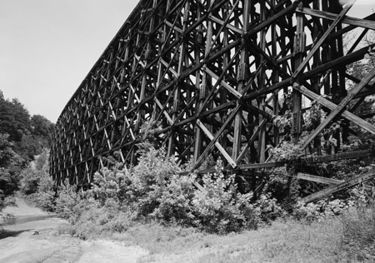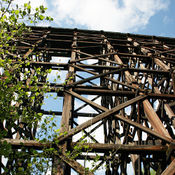Newfound Creek Trestle: Difference between revisions
mNo edit summary |
(add ref) |
||
| Line 15: | Line 15: | ||
* Ellaby, Liz (June 5, 2002) "Railroad trestle from 1914 arouses historians' interest." {{BN}} | * Ellaby, Liz (June 5, 2002) "Railroad trestle from 1914 arouses historians' interest." {{BN}} | ||
* Ellaby, Liz (October 7, 2004) "JeffCo to consider buying rail section for walking trail." {{BN}} | * Ellaby, Liz (October 7, 2004) "JeffCo to consider buying rail section for walking trail." {{BN}} | ||
* Lauer, Christopher (May 27, 2006) "Burning bridges" {{NJN}} | |||
* Lindberg, Robert J. and Mitchell, Joseph (Fall 2014) "Highest wooden railroad trestle in the United States in 1904." ''Newsletter of the [[Jefferson County Historical Association]].'' | * Lindberg, Robert J. and Mitchell, Joseph (Fall 2014) "Highest wooden railroad trestle in the United States in 1904." ''Newsletter of the [[Jefferson County Historical Association]].'' | ||
Revision as of 21:12, 4 March 2017
The Newfound Creek Trestle was a massive wooden railroad trestle originally constructed between 1901 and 1904 for the Cane Creek Branch of the Louisville & Nashville Railroad near Brookside in western Jefferson County. It was designated as L & N Cane Creek Trestle No. 10 on that line.
The trestle spanned over Newfound Creek between Bailey's Quarters and Crocker Junction, northeast of Brookside. It was about 115 feet tall and about 650 feet long, and curved across the Newfound Creek valley. Joshua Lafayette Mitchell was the trestle's designer and builder. The trestle was rebuilt and decked in 1957.
CSX Railroad stopped using the bridge in 1997 and removed the rails. Theron Spruell purchased the property surrounding the bridge and brought it to the attention of state officials. It was documented in April 2001 by National Park Service photographer Jet Lowe.
Plans were made to use it as part of a walking trail system.
The trestle burned down, possibly having been set alight by fireworks, on May 23, 2006.
References
- Ellaby, Liz (February 6, 2002) "Interest in preserving trestle begins to emerge." The Birmingham News
- Ellaby, Liz (June 5, 2002) "Railroad trestle from 1914 arouses historians' interest." The Birmingham News
- Ellaby, Liz (October 7, 2004) "JeffCo to consider buying rail section for walking trail." The Birmingham News
- Lauer, Christopher (May 27, 2006) "Burning bridges" North Jefferson News
- Lindberg, Robert J. and Mitchell, Joseph (Fall 2014) "Highest wooden railroad trestle in the United States in 1904." Newsletter of the Jefferson County Historical Association.
External links
- "Birmingham Mineral Railroad Viaduct, Spanning King Creek, Birmingham, Jefferson County, AL" Historic American Engineering Record (Survey No. HAER AL-202) at the Library of Congress
- photo of L&N train on the Newfound Creek Trestle

